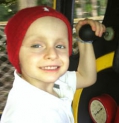
Hailing from all over the world, 90 researchers were invited to the first-ever ALSF Crazy 8 meeting in Philadelphia in September 2018.
By: Trish Adkins
Two years ago, Alex’s Lemonade Stand Foundation (ALSF) launched the Crazy 8 Initiative, an innovative grant program designed to create roadmaps toward cures for specific, hard-to-treat childhood cancers. The initiative focuses on eight specific areas of research: embryonal brain cancers, high grade gliomas, fusion-positive sarcomas, fusion-negative sarcomas, leukemias, neuroblastoma, big data and catalyzing clinical trials.
Since the launch of the Crazy 8 Initiative, ALSF has worked to bring together the leading minds in childhood cancer research from around the world. Together, these pioneers in research are charting the course towards cures for all children.
“The Crazy 8 is attacking what was once thought to be impossible and making it doable,” said Dr. John Maris, MD, Crazy 8 co-chair.
After a preliminary meeting in September 2018, ALSF awarded 11 pilot grants in 2019 covering the eight focus areas of the Crazy 8. Here is the update on three of these pilot projects:
1. Overcoming Obstacles to Drug Development in Pediatric Cancer, led by Crystal Mackall, MD, of Stanford University and Mark Kieran, MD/PhD, from Bristol-Myers Squibb
This project supported the 5th multi-stakeholder Pediatric Strategy Forum organized by the ACCELERATE group, who aim to improve the global development of drugs for children with cancer. The meeting brought together 72 participants from North America and Europe including academic experts, patient advocate groups, the European Medicines Agency (EMA) and the Food and Drug Administration (FDA) as well as eleven biopharmaceutical companies to discuss moving a new class of drugs called epigenetic modifiers toward the clinic for pediatric cancer patients. The meeting resulted in a prioritized list of eight classes of drugs to be moved into pediatric development. The attendees also discussed the RACE for Children ACT, which went into effect in August 2020 and requires pharmaceutical companies to evaluate new drugs in children with cancer as they develop drugs for adults.
To learn more about the forum and its outcomes, read the meeting publication here.
2. A Comprehensive Public Resource for Fusion-Negative Sarcoma Sequencing Data, led by Alejandro Sweet-Cordero, MD, of the University of California San Francisco and Richard Gorlick, MD, of MD Anderson Cancer Center
One roadblock toward a better understanding of sarcomas is that genetic sequencing data is housed in many different research labs and not available in one place for researchers to look broadly across many samples for genetic alterations that might inform improved drug design. This project is one of the first efforts at developing a database to share fusion-negative sarcoma data with the pediatric cancer research community and will, in the long term, enable progress for these aggressive tumors. The team developed a publicly available database of fusion-negative sarcoma data, including embryonal rhabdomyosarcoma and osteosarcoma.
3. Dissecting Microenvironmental Interactions in Pediatric High-Grade Gliomas that Promote Tumor Growth, led by Mariella Filbin, MD/PhD, of Dana-Farber Cancer Institute in collaboration with Michelle Monje, MD/PhD of Stanford University
This team is studying how high-grade glioma cells interact with their environment using a new technology called single-cell RNA-sequencing. This technology allows scientists to measure what happens in individual cells, as opposed to a cluster of cells. Studying high-grade glioma cells at single-cell resolution may clarify which mechanisms allow for glioma growth, how the cancer cells remodel their environment to evade the immune system and consequently may yield new therapeutic approaches.
The next stop in 2021 is the award of several four-year grants, totaling $18.5 million, to teams of international investigators studying potentially breakthrough research in the most pressing areas of childhood cancer research with one aim in mind: curing childhood cancer. Learn more about the Crazy 8 Initiative.

